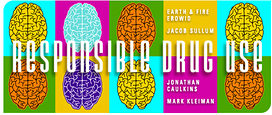If Mark “can think of no more powerful argument for maintaining the existing drug prohibitions than the almost universal opposition on the part of people who call themselves ‘drug policy reformers’ to any effective action to control the damage done by the currently licit drugs,” it sounds like he’s ready to support legalization. My impression, based on two decades of contact with drug policy reformers, is that the vast majority of them do favor what they consider to be effective action aimed at reducing the harm caused by currently licit drugs, although they may disagree about the details. Indeed, many of them support policies similar to what Mark advocates, including higher alcohol taxes.
“Every year,” Mark writes, “more than 20,000 Americans die as the result of other people’s drinking, and yet Jacob is against even modest taxes on alcohol.” He could, with equal logic, have said, “Every year, 37,000 Americans die as a result of driving, and yet Jacob is against even modest taxes on cars.” Or, “Every year, 30,000 Americans die as a result of gunshot wounds, and yet Jacob is against even modest taxes on firearms.” Or even, “Every year, 15,000 Americans die as a result of AIDS, and yet Jacob is against even modest taxes on sexual intercourse.” In each case, the principle is the same: Only a minority of the people subject to the tax are actually contributing to the death toll, and it is unfair to treat all of them as if they were equally irresponsible or anti-social.
I’m not sure John Stuart Mill’s opinion should be decisive on this question, but I don’t think he would have agreed with Mark’s position on alcohol taxes. “To tax stimulants [i.e., intoxicants] for the sole purpose of making them more difficult to be obtained,” Mill wrote in Chapter 5 of On Liberty, “is a measure differing only in degree from their entire prohibition; and would be justifiable only if that were justifiable. Every increase of cost is a prohibition, to those whose means do not come up to the augmented price; and to those who do, it is a penalty laid on them for gratifying a particular taste. Their choice of pleasures, and their mode of expending their income, after satisfying their legal and moral obligations to the State and to individuals, are their own concern, and must rest with their own judgment.” He went on to say that “sin taxes” nevertheless could be justified as a way of raising revenue from sales of “commodities the consumers can best spare” and whose immoderate use is “injurious.” But Mill clearly did not approve of using “sin taxes” primarily to discourage consumption of politically disfavored products, as Mark advocates.
Still, if doubling the alcohol tax is the price that must be paid for repealing drug prohibition, it would be well worth it. Deal?

